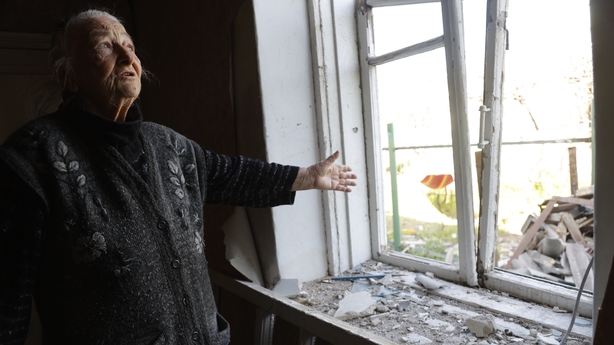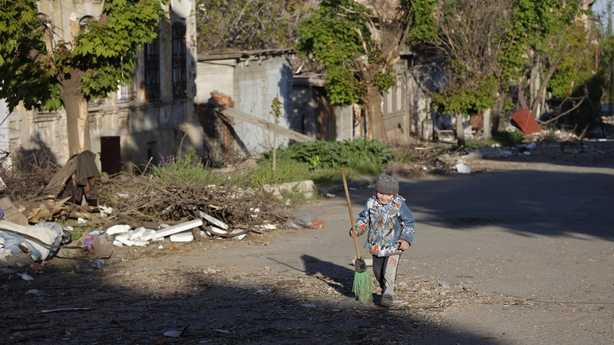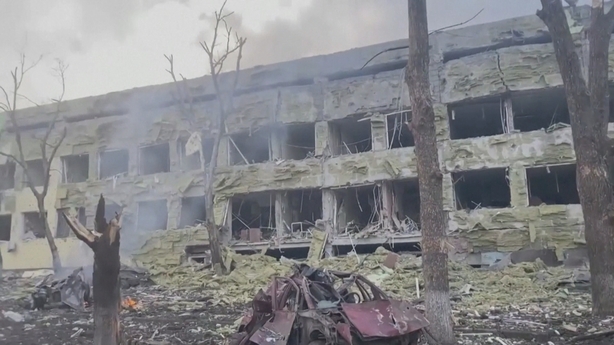Ukraine's last soldiers in the port city of Mariupol face a brutal final showdown with besieging Russian forces, who are hoping to deliver a critical win ahead of the country's victory day.
It comes as President Volodymyr Zelensky is also set to hold talks with G7 leaders via video conference to discuss the situation in his country, which fears a renewed intensity to Moscow's offensive after the evacuation of civilians from Mariupol's Azovstal steelworks.
The complex - the final pocket of Ukrainian resistance in the devastated port city - has taken on a symbolic value in the war, with the last soldiers holed up in its sprawling network of underground tunnels and bunkers.
Taking full control of Mariupol would allow Moscow to create a land bridge between the Crimean peninsula, which it annexed in 2014, and regions run by pro-Russian separatists in the east.
"The enemy is trying to finish off the defenders of Azovstal, they are trying to do it before 9 May to give (Russian President) Vladimir Putin a gift," Oleksiy Arestovych, an aide to Ukraine's president, said.
Ukraine's far-right Azov battalion, leading the defence at the steelworks, said one of its fighters had been killed and six wounded when Russian forces opened fire during an earlier attempt to evacuate people by car.
Mr Zelensky said hundreds of people had been removed from the plant on Saturday and that preparations for another stage of evacuation comprising the wounded and medics were under way.

Civilians who have escaped have described passing through Russian "filtration" sites where several evacuees told AFP they were questioned, strip-searched, fingerprinted, and had their phones and documents checked.
"They asked us if we wanted to go to Russia or to stay in (eastern Ukraine's self-proclaimed Donetsk People's Republic) or stay and rebuild the city of Mariupol," said Azovstal evacuee Natalia, who spoke on condition that her full name not be published.
"But how can I rebuild it? How can I return there if the city of Mariupol doesn't exist anymore?"
Earlier, Kyiv's defence ministry said Russian forces had resumed their assault on the site, despite talk of a truce to allow trapped civilians to flee.
Russia's forces may be seeking to hand President Putin a win ahead of Monday's Victory Day, when the country celebrates its 1945 defeat of Nazi Germany.
With the date fast approaching, Ukrainian officials fear more intense missile and artillery bombardments and renewed assaults as Moscow scrambles for symbolic victories.
At home, Russia will mark the holiday in grand style, with eight Mig-29 fighter jets set to fly over Moscow's Red Square forming the letter "Z" - the mark of Russia's military assault in Ukraine.

Timeline of the siege of Mariupol
Located on the Sea of Azov, the city has been a key prize for Russia in its bid to join up the annexed Crimea peninsula to the west with territory held by pro-Russian rebels in the east.
Mariupol is a predominantly Russian-speaking city of 441,000 inhabitants some 55km fom the Russian border and 85km from the pro-Russian separatist stronghold of Donetsk
2 March
A week after the Russian invasion of Ukraine, Moscow's artillery begins pounding Mariupol. The mayor accuses Russian forces and pro-Russian fighters of seeking to "impose a blockade" by cutting off food supplies and vital infrastructure, including water, electricity and heating.
9 March
Russia targets a building housing a maternity ward and paediatric hospital in Mariupol, killing three, including a young girl. Ukraine and the European Union condemn a "war crime". Russia claims the building is sheltering Ukrainian nationalists.
Mid-March
The start of the evacuation of thousands of civilians from the city through a humanitarian corridor.
Earlier evacuation attempts had collapsed with both sides accusing the other of failing to halt fire.
16 March
Russian air strikes raze a theatre sheltering hundreds of people, mostly women and children. It takes days to reach survivors trapped in an underground shelter. Ukrainian authorities estimate some 300 people were killed. Moscow denies the attack, blaming Ukraine's far-right Azov battalion, based in the city.
30 March
Moscow announces a ceasefire to allow the evacuation of civilians from Mariupol to the Ukrainian-controlled city of Zaporizhzhia.

April
On 4 April, Mariupol mayor Vadym Boychenko says the city has been "90%" destroyed. On 7 April, the new "mayor" of Mariupol, Konstantin Ivashchenko, installed by pro-Russian forces, says that around 5,000 civilians have died.
On 11 April, marines in Mariupol say they are preparing for a "last battle", with fighting concentrated at the Azovstal steelworks after separatists say they seized the port. The next day, the regional authorities say at least 20,000 people have been killed.
Over the following week, Russia issues a string of ultimatums to troops holed up at the steelworks to give themselves up but they refuse.
On 21 April, Russian President Vladimir Putin declares the "liberation" of Mariupol to be a "success." He orders the Russian military to refrain from storming the Azovstal plant, telling them to besiege it instead, "so that not even a fly can escape."
May
On 2 May, an initial group of around 100 civilians is evacuated from the plant, arriving in Zaporizhzhia.
On 3 May, Russian forces launch a "powerful assault" on the plant using artillery and planes, according to Ukraine.
The next day, Russia announces its forces will cease fire at Azovstal and open a humanitarian corridor for civilian evacuations for three days. Ukrainian fighters say the assault continues.
On 6 May, the Ukrainian presidency says almost 500 civilians have been evacuated in total, but the UN-led rescue operation is ongoing.
A day later, Kyiv says "all women, children and the elderly" have been extracted from the plant to safety.
It urges Doctors Without Borders (MSF) to evacuate its soldiers from the steel plant, adding those wounded are "dying because of gangrene and sepsis" without medicine.

